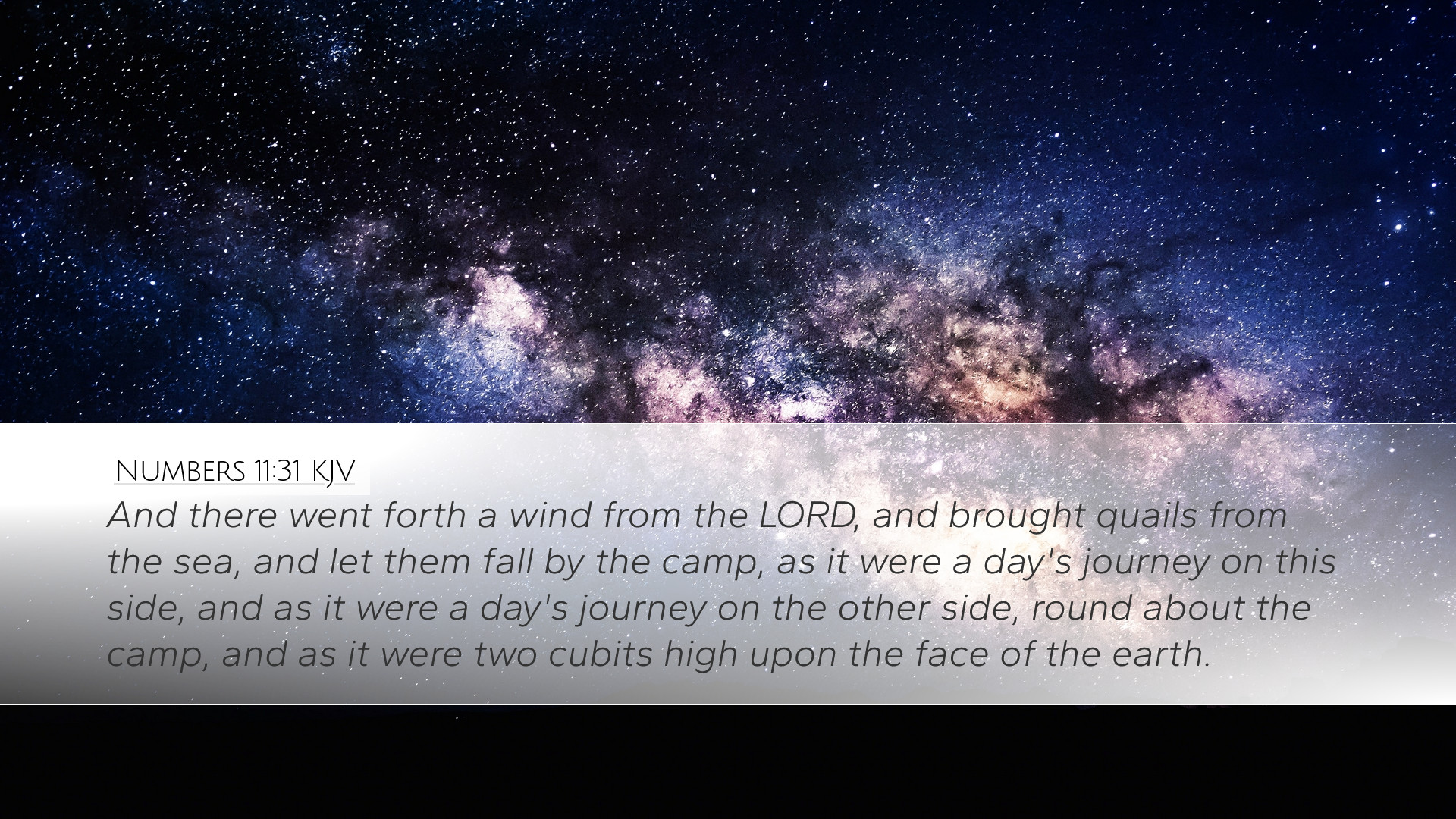Commentary on Numbers 11:31
Numbers 11:31 reads: "And there went forth a wind from the Lord, and brought quails from the sea, and let them fall by the camp, as it were a day's journey on this side, and as it were a day's journey on the other side, round about the camp, and as it were two cubits high upon the face of the earth." This passage encapsulates a pivotal moment in the experience of the Israelites during their exodus, marked by divine provision in response to their complaints.
Overview of the Context
The events leading to Numbers 11 are characterized by the discontentment and complaints of the Israelites. After receiving the miraculous provisions in the form of manna, they yearned for the flesh pots of Egypt, expressing dissatisfaction with the gifts of God. This context sets the stage for God’s response in providing quail, which not only serves as nourishment but also as a lesson on divine grace and human folly.
Divine Intervention and Provision
This verse illustrates God's profound involvement in the lives of His people. As noted by Matthew Henry, "God's anger was kindled against the people, yet His mercy prevailed." In providing quail, God demonstrates that even in their rebellion and ingratitude, His faithfulness remains unshaken.
The Significance of the Wind
Albert Barnes remarks on the "wind" that brought the quails, suggesting it was a supernatural element orchestrated by God. He explains:
- The phrase "went forth a wind from the Lord" signifies divine agency in the natural order, illustrating how God can employ creation to fulfill His purposes.
- God utilizes the wind to gather the quails, showing that He is the Lord of all nature and sustains life through mysterious yet effective means.
The Quantity and Quality of the Provision
The text emphasizes the overwhelming quantity of the quails, which fell around the camp "as it were a day's journey...". Adam Clarke highlights that this provision was abundant, displaying God’s ability to meet the needs of His people beyond their expectations:
- The description of the quails covering the ground "as it were two cubits high upon the face of the earth" serves as an indication of God's generosity.
- Clarke further emphasizes the absurdity of their request: they desired meat in addition to the heavenly bread and God gave them not just enough, but an excess.
Theological Implications
Numbers 11:31 reveals profound theological truths relevant to pastoral and scholarly discourse:
- The nature of God's provision: This passage demonstrates that God's gifts are often more than what we ask for, reflecting His goodness and grace.
- Human dissatisfaction: The immediate context reveals a perennial problem among believers—the tendency to overlook God's past provisions and yearn for what is familiar, even if it is detrimental.
- Judgment and mercy coexisting: Despite Israel's rebellion, God's provision points towards a call to repentance and reflects His mercy amid judgment.
Application for Believers
For pastors, students, and theologians, this verse invites numerous applications:
- Recognizing God's daily provisions: Believers are encouraged to acknowledge God’s daily sustenance in spiritual and physical needs, as seen in the Israelites’ experience.
- The danger of forgetfulness: It serves as a warning against nostalgia for sinful pasts, reminding us to focus on God's current blessings.
- A lesson in obedience: As God provides abundantly, we must respond with gratitude and stewardship instead of complaint.
Conclusion
Numbers 11:31 is a powerful reminder of God's sovereignty and faithfulness amidst human frailty. As believers reflect on this passage, they are challenged to consider their response to God's providence, the richness of His grace, and the lessons learned from the Israelites' journey. In conjunction with the insights of Matthew Henry, Albert Barnes, and Adam Clarke, this verse not only offers a historical lesson but also calls for spiritual introspection and growth.


